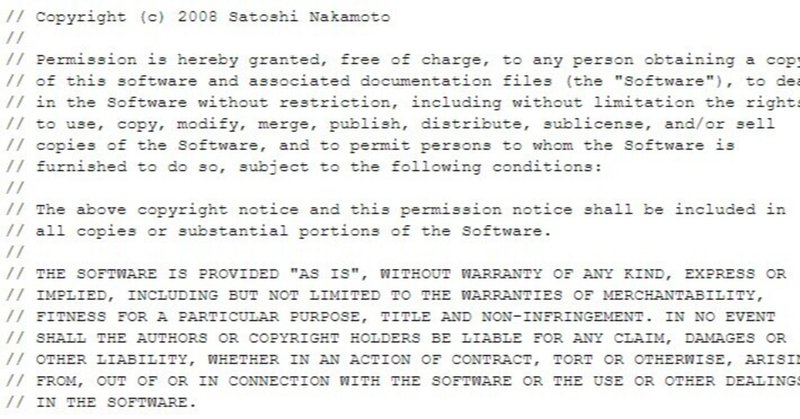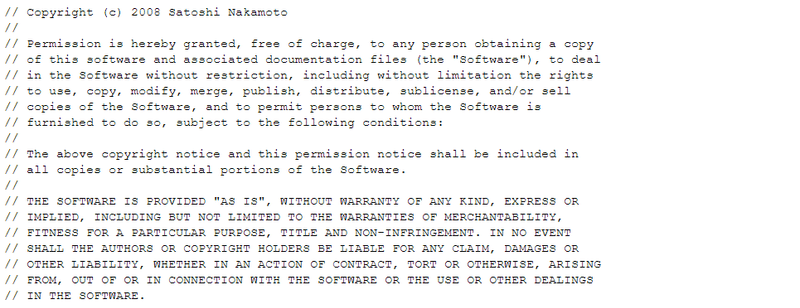
ビットコインのソースコード

2008年11月16日数か月前からのビットコインソースです。
4つのソースコードファイルであり、それらを貼り付けます
それらの1つは66Kです。下はわざと(main.cpp)を分割してあり、完全なコピー(ほぼ完全ですが)ではありません。
下記及びビットコインホワイトペーパーの著作権は現在 クレイグ・ライトにあります。裁判官もクレイグをサトシと認識していて異議は認められませんので。
この状態でフェイクトシなどと言ってる人は単に偽旗を立てるのが好きなだけのレイシストと判断するので、ツイッターでもブロックしてます。まあ少額払うシステムのTwetchではそういう人の率は減る傾向であるという部分で勝ってるのは事実なんで。だから方向性間違えてないという裏付けはもう今、現にあるわけです。5chにマネーボタンが付けばレイシストや匿名=犯罪を理解しないで失礼な書き込みする人やハッカー達は死滅に至ると思います。ハック不能になって安全、快適でバカ派手なバナーや飛ばし減ったほうがいいでしょ?
ビットコインホワイトペーパー
ビットコイン P2P 電子キャッシュ ペーパー
純粋なピア ツー ピア バージョンの電子キャッシュは、オンライン決済を一方の当事者から他方の当事者に直接送信できるようにする金融機関を経由する負担がありません。
https://craigwright.net/bitcoin-white-paper.pdf


プログラムに詳しい方は読んでみてください
**********ここから********************************
//著作権(C)2008聡中本
//
//パーミッションは、ここにコピー取得するすべての人に、無償で付与されている
対処するために、このソフトウェアの//および関連文書のファイル(「ソフトウェア」)
で//を
//ソフトウェアのコピーを使用、コピー、変更、マージ、公開、配布、サブライセンス、および/または販売する権利、および
//ソフトウェアが
提供される人に//許可する権利を含むがこれらに限定されない制限のないソフトウェア以下の条件に、その対象の操作を行います。
//
//上記の著作権表示とこの許可通知が含まれなければならない
//ソフトウェアのすべてのコピーまたは大部分。
//
//ソフトウェアは「現状有姿」で
提供され、商品性、権原、
および非侵害の保証を含むがこれらに限定されない、明示または黙示を問わず、いかなる種類の保証もありません。でNO EVENT
//は作者または著作権所有者は、FORいかなる請求、損害または責任も負わないものと
//その他の責任、契約のあるかどうかにAN ACTION、不法行為もしくはその他の損失、データの損失、
ソフトウェアまたはTHE WITH、OUT ORのIN接続から//使用またはその他の取引
//ソフトウェア内。
// Copyright (c) 2008 Satoshi Nakamoto
//
// Permission is hereby granted, free of charge, to any person obtaining a copy
// of this software and associated documentation files (the "Software"), to deal
// in the Software without restriction, including without limitation the rights
// to use, copy, modify, merge, publish, distribute, sublicense, and/or sell
// copies of the Software, and to permit persons to whom the Software is
// furnished to do so, subject to the following conditions:
//
// The above copyright notice and this permission notice shall be included in
// all copies or substantial portions of the Software.
//
// THE SOFTWARE IS PROVIDED "AS IS", WITHOUT WARRANTY OF ANY KIND, EXPRESS OR
// IMPLIED, INCLUDING BUT NOT LIMITED TO THE WARRANTIES OF MERCHANTABILITY,
// FITNESS FOR A PARTICULAR PURPOSE, TITLE AND NON-INFRINGEMENT. IN NO EVENT
// SHALL THE AUTHORS OR COPYRIGHT HOLDERS BE LIABLE FOR ANY CLAIM, DAMAGES OR
// OTHER LIABILITY, WHETHER IN AN ACTION OF CONTRACT, TORT OR OTHERWISE, ARISING
// FROM, OUT OF OR IN CONNECTION WITH THE SOFTWARE OR THE USE OR OTHER DEALINGS
// IN THE SOFTWARE.
class COutPoint;
class CInPoint;
class CDiskTxPos;
class CCoinBase;
class CTxIn;
class CTxOut;
class CTransaction;
class CBlock;
class CBlockIndex;
class CWalletTx;
class CKeyItem;
static const unsigned int MAX_SIZE = 0x02000000;
static const int64 COIN = 1000000;
static const int64 CENT = 10000;
static const int64 TRANSACTIONFEE = 1 * CENT; /// change this to a user options setting, optional fee can be zero
///static const unsigned int MINPROOFOFWORK = 40; /// need to decide the right difficulty to start with
static const unsigned int MINPROOFOFWORK = 20; /// ridiculously easy for testing
extern map<uint256, CBlockIndex*> mapBlockIndex;
extern const uint256 hashGenesisBlock;
extern CBlockIndex* pindexGenesisBlock;
extern int nBestHeight;
extern CBlockIndex* pindexBest;
extern unsigned int nTransactionsUpdated;
extern int fGenerateBitcoins;
FILE* OpenBlockFile(unsigned int nFile, unsigned int nBlockPos, const char* pszMode="rb");
FILE* AppendBlockFile(unsigned int& nFileRet);
bool AddKey(const CKey& key);
vector<unsigned char> GenerateNewKey();
bool AddToWallet(const CWalletTx& wtxIn);
void ReacceptWalletTransactions();
void RelayWalletTransactions();
bool LoadBlockIndex(bool fAllowNew=true);
bool BitcoinMiner();
bool ProcessMessages(CNode* pfrom);
bool ProcessMessage(CNode* pfrom, string strCommand, CDataStream& vRecv);
bool SendMessages(CNode* pto);
int64 CountMoney();
bool CreateTransaction(CScript scriptPubKey, int64 nValue, CWalletTx& txNew);
bool SendMoney(CScript scriptPubKey, int64 nValue, CWalletTx& wtxNew);
class CDiskTxPos
{
public:
unsigned int nFile;
unsigned int nBlockPos;
unsigned int nTxPos;
CDiskTxPos()
{
SetNull();
}
CDiskTxPos(unsigned int nFileIn, unsigned int nBlockPosIn, unsigned int nTxPosIn)
{
nFile = nFileIn;
nBlockPos = nBlockPosIn;
nTxPos = nTxPosIn;
}
IMPLEMENT_SERIALIZE( READWRITE(FLATDATA(*this)); )
void SetNull() { nFile = -1; nBlockPos = 0; nTxPos = 0; }
bool IsNull() const { return (nFile == -1); }
friend bool operator==(const CDiskTxPos& a, const CDiskTxPos& b)
{
return (a.nFile == b.nFile &&
a.nBlockPos == b.nBlockPos &&
a.nTxPos == b.nTxPos);
}
friend bool operator!=(const CDiskTxPos& a, const CDiskTxPos& b)
{
return !(a == b);
}
void print() const
{
if (IsNull())
printf("null");
else
printf("(nFile=%d, nBlockPos=%d, nTxPos=%d)", nFile, nBlockPos, nTxPos);
}
};
class CInPoint
{
public:
CTransaction* ptx;
unsigned int n;
CInPoint() { SetNull(); }
CInPoint(CTransaction* ptxIn, unsigned int nIn) { ptx = ptxIn; n = nIn; }
void SetNull() { ptx = NULL; n = -1; }
bool IsNull() const { return (ptx == NULL && n == -1); }
};
class COutPoint
{
public:
uint256 hash;
unsigned int n;
COutPoint() { SetNull(); }
COutPoint(uint256 hashIn, unsigned int nIn) { hash = hashIn; n = nIn; }
IMPLEMENT_SERIALIZE( READWRITE(FLATDATA(*this)); )
void SetNull() { hash = 0; n = -1; }
bool IsNull() const { return (hash == 0 && n == -1); }
friend bool operator<(const COutPoint& a, const COutPoint& b)
{
return (a.hash < b.hash || (a.hash == b.hash && a.n < b.n));
}
friend bool operator==(const COutPoint& a, const COutPoint& b)
{
return (a.hash == b.hash && a.n == b.n);
}
friend bool operator!=(const COutPoint& a, const COutPoint& b)
{
return !(a == b);
}
void print() const
{
printf("COutPoint(%s, %d)", hash.ToString().substr(0,6).c_str(), n);
}
};
//
// An input of a transaction. It contains the location of the previous
// transaction's output that it claims and a signature that matches the
// output's public key.
//
class CTxIn
{
public:
COutPoint prevout;
CScript scriptSig;
CTxIn()
{
}
CTxIn(COutPoint prevoutIn, CScript scriptSigIn)
{
prevout = prevoutIn;
scriptSig = scriptSigIn;
}
CTxIn(uint256 hashPrevTx, unsigned int nOut, CScript scriptSigIn)
{
prevout = COutPoint(hashPrevTx, nOut);
scriptSig = scriptSigIn;
}
IMPLEMENT_SERIALIZE
(
READWRITE(prevout);
READWRITE(scriptSig);
)
bool IsPrevInMainChain() const
{
return CTxDB("r").ContainsTx(prevout.hash);
}
friend bool operator==(const CTxIn& a, const CTxIn& b)
{
return (a.prevout == b.prevout && a.scriptSig == b.scriptSig);
}
friend bool operator!=(const CTxIn& a, const CTxIn& b)
{
return !(a == b);
}
void print() const
{
printf("CTxIn(");
prevout.print();
if (prevout.IsNull())
{
printf(", coinbase %s)\n", HexStr(scriptSig.begin(), scriptSig.end(), false).c_str());
}
else
{
if (scriptSig.size() >= 6)
printf(", scriptSig=%02x%02x", scriptSig[4], scriptSig[5]);
printf(")\n");
}
}
bool IsMine() const;
int64 GetDebit() const;
};
//
// An output of a transaction. It contains the public key that the next input
// must be able to sign with to claim it.
//
class CTxOut
{
public:
int64 nValue;
unsigned int nSequence;
CScript scriptPubKey;
// disk only
CDiskTxPos posNext; //// so far this is only used as a flag, nothing uses the location
public:
CTxOut()
{
nValue = 0;
nSequence = UINT_MAX;
}
CTxOut(int64 nValueIn, CScript scriptPubKeyIn, int nSequenceIn=UINT_MAX)
{
nValue = nValueIn;
scriptPubKey = scriptPubKeyIn;
nSequence = nSequenceIn;
}
IMPLEMENT_SERIALIZE
(
READWRITE(nValue);
READWRITE(nSequence);
READWRITE(scriptPubKey);
if (nType & SER_DISK)
READWRITE(posNext);
)
uint256 GetHash() const { return SerializeHash(*this); }
bool IsFinal() const
{
return (nSequence == UINT_MAX);
}
bool IsMine() const
{
return ::IsMine(scriptPubKey);
}
int64 GetCredit() const
{
if (IsMine())
return nValue;
return 0;
}
friend bool operator==(const CTxOut& a, const CTxOut& b)
{
return (a.nValue == b.nValue &&
a.nSequence == b.nSequence &&
a.scriptPubKey == b.scriptPubKey);
}
friend bool operator!=(const CTxOut& a, const CTxOut& b)
{
return !(a == b);
}
void print() const
{
if (scriptPubKey.size() >= 6)
printf("CTxOut(nValue=%I64d, nSequence=%u, scriptPubKey=%02x%02x, posNext=", nValue, nSequence, scriptPubKey[4], scriptPubKey[5]);
posNext.print();
printf(")\n");
}
};
//
// The basic transaction that is broadcasted on the network and contained in
// blocks. A transaction can contain multiple inputs and outputs.
//
class CTransaction
{
public:
vector<CTxIn> vin;
vector<CTxOut> vout;
unsigned int nLockTime;
CTransaction()
{
SetNull();
}
IMPLEMENT_SERIALIZE
(
if (!(nType & SER_GETHASH))
READWRITE(nVersion);
// Set version on stream for writing back same version
if (fRead && s.nVersion == -1)
s.nVersion = nVersion;
READWRITE(vin);
READWRITE(vout);
READWRITE(nLockTime);
)
void SetNull()
{
vin.clear();
vout.clear();
nLockTime = 0;
}
bool IsNull() const
{
return (vin.empty() && vout.empty());
}
uint256 GetHash() const
{
return SerializeHash(*this);
}
bool AllPrevInMainChain() const
{
foreach(const CTxIn& txin, vin)
if (!txin.IsPrevInMainChain())
return false;
return true;
}
bool IsFinal() const
{
if (nLockTime == 0)
return true;
if (nLockTime < GetAdjustedTime())
return true;
foreach(const CTxOut& txout, vout)
if (!txout.IsFinal())
return false;
return true;
}
bool IsUpdate(const CTransaction& b) const
{
if (vin.size() != b.vin.size() || vout.size() != b.vout.size())
return false;
for (int i = 0; i < vin.size(); i++)
if (vin[i].prevout != b.vin[i].prevout)
return false;
bool fNewer = false;
unsigned int nLowest = UINT_MAX;
for (int i = 0; i < vout.size(); i++)
{
if (vout[i].nSequence != b.vout[i].nSequence)
{
if (vout[i].nSequence <= nLowest)
{
fNewer = false;
nLowest = vout[i].nSequence;
}
if (b.vout[i].nSequence < nLowest)
{
fNewer = true;
nLowest = b.vout[i].nSequence;
}
}
}
return fNewer;
}
bool IsCoinBase() const
{
return (vin.size() == 1 && vin[0].prevout.IsNull());
}
bool CheckTransaction() const
{
// Basic checks that don't depend on any context
if (vin.empty() || vout.empty())
return false;
// Check for negative values
int64 nValueOut = 0;
foreach(const CTxOut& txout, vout)
{
if (txout.nValue < 0)
return false;
nValueOut += txout.nValue;
}
if (IsCoinBase())
{
if (vin[0].scriptSig.size() > 100)
return false;
}
else
{
foreach(const CTxIn& txin, vin)
if (txin.prevout.IsNull())
return false;
}
return true;
}
bool IsMine() const
{
foreach(const CTxOut& txout, vout)
if (txout.IsMine())
return true;
return false;
}
int64 GetDebit() const
{
int64 nDebit = 0;
foreach(const CTxIn& txin, vin)
nDebit += txin.GetDebit();
return nDebit;
}
int64 GetCredit() const
{
int64 nCredit = 0;
foreach(const CTxOut& txout, vout)
nCredit += txout.GetCredit();
return nCredit;
}
int64 GetValueOut() const
{
int64 nValueOut = 0;
foreach(const CTxOut& txout, vout)
{
if (txout.nValue < 0)
throw runtime_error("CTransaction::GetValueOut() : negative value");
nValueOut += txout.nValue;
}
return nValueOut;
}
bool ReadFromDisk(CDiskTxPos pos, FILE** pfileRet=NULL)
{
CAutoFile filein = OpenBlockFile(pos.nFile, 0, pfileRet ? "rb+" : "rb");
if (!filein)
return false;
// Read transaction
if (fseek(filein, pos.nTxPos, SEEK_SET) != 0)
return false;
filein >> *this;
// Return file pointer
if (pfileRet)
{
if (fseek(filein, pos.nTxPos, SEEK_SET) != 0)
return false;
*pfileRet = filein.release();
}
return true;
}
friend bool operator==(const CTransaction& a, const CTransaction& b)
{
return (a.vin == b.vin &&
a.vout == b.vout &&
a.nLockTime == b.nLockTime);
}
friend bool operator!=(const CTransaction& a, const CTransaction& b)
{
return !(a == b);
}
void print() const
{
printf("CTransaction(vin.size=%d, vout.size=%d, nLockTime=%d)\n",
vin.size(),
vout.size(),
nLockTime);
for (int i = 0; i < vin.size(); i++)
{
printf(" ");
vin[i].print();
}
for (int i = 0; i < vout.size(); i++)
{
printf(" ");
vout[i].print();
}
}
bool TestDisconnectInputs(CTxDB& txdb, map<uint256, CTransaction>& mapTestPool)
{
return DisconnectInputs(txdb, mapTestPool, true);
}
bool TestConnectInputs(CTxDB& txdb, map<uint256, CTransaction>& mapTestPool, bool fMemoryTx, bool fIgnoreDiskConflicts, int64& nFees)
{
return ConnectInputs(txdb, mapTestPool, CDiskTxPos(1, 1, 1), 0, true, fMemoryTx, fIgnoreDiskConflicts, nFees);
}
bool DisconnectInputs(CTxDB& txdb)
{
static map<uint256, CTransaction> mapTestPool;
return DisconnectInputs(txdb, mapTestPool, false);
}
bool ConnectInputs(CTxDB& txdb, CDiskTxPos posThisTx, int nHeight)
{
static map<uint256, CTransaction> mapTestPool;
int64 nFees;
return ConnectInputs(txdb, mapTestPool, posThisTx, nHeight, false, false, false, nFees);
}
private:
bool DisconnectInputs(CTxDB& txdb, map<uint256, CTransaction>& mapTestPool, bool fTest);
bool ConnectInputs(CTxDB& txdb, map<uint256, CTransaction>& mapTestPool, CDiskTxPos posThisTx, int nHeight,
bool fTest, bool fMemoryTx, bool fIgnoreDiskConflicts, int64& nFees);
public:
bool AcceptTransaction(CTxDB& txdb, bool fCheckInputs=true);
bool AcceptTransaction() { CTxDB txdb("r"); return AcceptTransaction(txdb); }
bool ClientConnectInputs();
};
//
// A transaction with a merkle branch linking it to the timechain
//
class CMerkleTx : public CTransaction
{
public:
uint256 hashBlock;
vector<uint256> vMerkleBranch;
int nIndex;
CMerkleTx()
{
Init();
}
CMerkleTx(const CTransaction& txIn) : CTransaction(txIn)
{
Init();
}
void Init()
{
hashBlock = 0;
nIndex = -1;
}
IMPLEMENT_SERIALIZE
(
nSerSize += SerReadWrite(s, *(CTransaction*)this, nType, nVersion, ser_action);
if (!(nType & SER_GETHASH))
READWRITE(nVersion);
READWRITE(hashBlock);
READWRITE(vMerkleBranch);
READWRITE(nIndex);
)
int SetMerkleBranch();
int IsInMainChain() const;
bool AcceptTransaction(CTxDB& txdb, bool fCheckInputs=true);
bool AcceptTransaction() { CTxDB txdb("r"); return AcceptTransaction(txdb); }
};
//
// A transaction with a bunch of additional info that only the owner cares
// about. It includes any unrecorded transactions needed to link it back
// to the timechain.
//
class CWalletTx : public CMerkleTx
{
public:
vector<CMerkleTx> vtxPrev;
map<string, string> mapValue;
vector<pair<string, string> > vOrderForm;
unsigned int nTime;
char fFromMe;
char fSpent;
//// probably need to sign the order info so know it came from payer
CWalletTx()
{
Init();
}
CWalletTx(const CMerkleTx& txIn) : CMerkleTx(txIn)
{
Init();
}
CWalletTx(const CTransaction& txIn) : CMerkleTx(txIn)
{
Init();
}
void Init()
{
nTime = 0;
fFromMe = false;
fSpent = false;
}
IMPLEMENT_SERIALIZE
(
/// would be nice for it to return the version number it reads, maybe use a reference
nSerSize += SerReadWrite(s, *(CMerkleTx*)this, nType, nVersion, ser_action);
if (!(nType & SER_GETHASH))
READWRITE(nVersion);
READWRITE(vtxPrev);
READWRITE(mapValue);
READWRITE(vOrderForm);
READWRITE(nTime);
READWRITE(fFromMe);
READWRITE(fSpent);
)
bool WriteToDisk()
{
return CWalletDB().WriteTx(GetHash(), *this);
}
void AddSupportingTransactions(CTxDB& txdb);
void AddSupportingTransactions() { CTxDB txdb("r"); AddSupportingTransactions(txdb); }
bool AcceptWalletTransaction(CTxDB& txdb, bool fCheckInputs=true);
bool AcceptWalletTransaction() { CTxDB txdb("r"); return AcceptWalletTransaction(txdb); }
void RelayWalletTransaction(CTxDB& txdb);
void RelayWalletTransaction() { CTxDB txdb("r"); RelayWalletTransaction(txdb); }
};
//
// Nodes collect new transactions into a block, hash them into a hash tree,
// and scan through nonce values to make the block's hash satisfy proof-of-work
// requirements. When they solve the proof-of-work, they broadcast the block
// to everyone and the block is added to the timechain. The first transaction
// in the block is a special one that creates a new coin owned by the creator
// of the block.
//
// Blocks are appended to blk0001.dat files on disk. Their location on disk
// is indexed by CBlockIndex objects in memory.
//
class CBlock
{
public:
// header
uint256 hashPrevBlock;
uint256 hashMerkleRoot;
unsigned int nTime;
unsigned int nBits;
unsigned int nNonce;
// network and disk
vector<CTransaction> vtx;
// memory only
mutable vector<uint256> vMerkleTree;
CBlock()
{
SetNull();
}
IMPLEMENT_SERIALIZE
(
if (!(nType & SER_GETHASH))
READWRITE(nVersion);
READWRITE(hashPrevBlock);
READWRITE(hashMerkleRoot);
READWRITE(nTime);
READWRITE(nBits);
READWRITE(nNonce);
// ConnectBlock depends on vtx being last so it can calculate offset
if (!(nType & (SER_GETHASH|SER_BLOCKHEADERONLY)))
READWRITE(vtx);
else if (fRead)
const_cast<CBlock*>(this)->vtx.clear();
)
void SetNull()
{
hashPrevBlock = 0;
hashMerkleRoot = 0;
nTime = 0;
nBits = 0;
nNonce = 0;
vtx.clear();
vMerkleTree.clear();
}
bool IsNull() const
{
return (nBits == 0);
}
uint256 GetHash() const
{
return Hash(BEGIN(hashPrevBlock), END(nNonce));
}
uint256 BuildMerkleTree() const
{
vMerkleTree.clear();
foreach(const CTransaction& tx, vtx)
vMerkleTree.push_back(tx.GetHash());
int j = 0;
for (int nSize = vtx.size(); nSize > 1; nSize = (nSize + 1) / 2)
{
for (int i = 0; i < nSize; i += 2)
{
int i2 = min(i+1, nSize-1);
vMerkleTree.push_back(Hash(BEGIN(vMerkleTree[j+i]), END(vMerkleTree[j+i]),
BEGIN(vMerkleTree[j+i2]), END(vMerkleTree[j+i2])));
}
j += nSize;
}
return (vMerkleTree.empty() ? 0 : vMerkleTree.back());
}
vector<uint256> GetMerkleBranch(int nIndex) const
{
if (vMerkleTree.empty())
BuildMerkleTree();
vector<uint256> vMerkleBranch;
int j = 0;
for (int nSize = vtx.size(); nSize > 1; nSize = (nSize + 1) / 2)
{
int i = min(nIndex^1, nSize-1);
vMerkleBranch.push_back(vMerkleTree[j+i]);
nIndex >>= 1;
j += nSize;
}
return vMerkleBranch;
}
static uint256 CheckMerkleBranch(uint256 hash, const vector<uint256>& vMerkleBranch, int nIndex)
{
foreach(const uint256& otherside, vMerkleBranch)
{
if (nIndex & 1)
hash = Hash(BEGIN(otherside), END(otherside), BEGIN(hash), END(hash));
else
hash = Hash(BEGIN(hash), END(hash), BEGIN(otherside), END(otherside));
nIndex >>= 1;
}
return hash;
}
bool WriteToDisk(bool fWriteTransactions, unsigned int& nFileRet, unsigned int& nBlockPosRet)
{
// Open history file to append
CAutoFile fileout = AppendBlockFile(nFileRet);
if (!fileout)
return false;
if (!fWriteTransactions)
fileout.nType |= SER_BLOCKHEADERONLY;
// Write index header
unsigned int nSize = fileout.GetSerializeSize(*this);
fileout << FLATDATA(pchMessageStart) << nSize;
// Write block
nBlockPosRet = ftell(fileout);
if (nBlockPosRet == -1)
return false;
fileout << *this;
return true;
}
bool ReadFromDisk(unsigned int nFile, unsigned int nBlockPos, bool fReadTransactions)
{
SetNull();
// Open history file to read
CAutoFile filein = OpenBlockFile(nFile, nBlockPos, "rb");
if (!filein)
return false;
if (!fReadTransactions)
filein.nType |= SER_BLOCKHEADERONLY;
// Read block
filein >> *this;
// Check the header
if (nBits < MINPROOFOFWORK || GetHash() > (~uint256(0) >> nBits))
return error("CBlock::ReadFromDisk : errors in block header");
return true;
}
void print() const
{
printf("CBlock(hashPrevBlock=%s, hashMerkleRoot=%s, nTime=%u, nBits=%u, nNonce=%u, vtx=%d)\n",
hashPrevBlock.ToString().substr(0,6).c_str(),
hashMerkleRoot.ToString().substr(0,6).c_str(),
nTime, nBits, nNonce,
vtx.size());
for (int i = 0; i < vtx.size(); i++)
{
printf(" ");
vtx[i].print();
}
printf(" vMerkleTree: ");
for (int i = 0; i < vMerkleTree.size(); i++)
printf("%s ", vMerkleTree[i].ToString().substr(0,6).c_str());
printf("\n");
}
bool ReadFromDisk(const CBlockIndex* blockindex, bool fReadTransactions);
bool TestDisconnectBlock(CTxDB& txdb, map<uint256, CTransaction>& mapTestPool);
bool TestConnectBlock(CTxDB& txdb, map<uint256, CTransaction>& mapTestPool);
bool DisconnectBlock();
bool ConnectBlock(unsigned int nFile, unsigned int nBlockPos, int nHeight);
bool AddToBlockIndex(unsigned int nFile, unsigned int nBlockPos, bool fWriteDisk);
bool CheckBlock() const;
bool AcceptBlock();
};
//
// The timechain is a tree shaped structure starting with the
// genesis block at the root, with each block potentially having multiple
// candidates to be the next block. pprev and pnext link a path through the
// main/longest chain. A blockindex may have multiple pprev pointing back
// to it, but pnext will only point forward to the longest branch, or will
// be null if the block is not part of the longest chain.
//
class CBlockIndex
{
public:
CBlockIndex* pprev;
CBlockIndex* pnext;
unsigned int nFile;
unsigned int nBlockPos;
int nHeight;
CBlockIndex()
{
pprev = NULL;
pnext = NULL;
nFile = 0;
nBlockPos = 0;
nHeight = 0;
}
CBlockIndex(unsigned int nFileIn, unsigned int nBlockPosIn)
{
pprev = NULL;
pnext = NULL;
nFile = nFileIn;
nBlockPos = nBlockPosIn;
nHeight = 0;
}
bool IsInMainChain() const
{
return (pnext || this == pindexBest);
}
bool EraseBlockFromDisk()
{
// Open history file
CAutoFile fileout = OpenBlockFile(nFile, nBlockPos, "rb+");
if (!fileout)
return false;
// Overwrite with empty null block
CBlock block;
block.SetNull();
fileout << block;
return true;
}
bool TestDisconnectBlock(CTxDB& txdb, map<uint256, CTransaction>& mapTestPool)
{
CBlock block;
if (!block.ReadFromDisk(nFile, nBlockPos, true))
return false;
return block.TestDisconnectBlock(txdb, mapTestPool);
}
bool TestConnectBlock(CTxDB& txdb, map<uint256, CTransaction>& mapTestPool)
{
CBlock block;
if (!block.ReadFromDisk(nFile, nBlockPos, true))
return false;
return block.TestConnectBlock(txdb, mapTestPool);
}
bool DisconnectBlock()
{
CBlock block;
if (!block.ReadFromDisk(nFile, nBlockPos, true))
return false;
return block.DisconnectBlock();
}
bool ConnectBlock()
{
CBlock block;
if (!block.ReadFromDisk(nFile, nBlockPos, true))
return false;
return block.ConnectBlock(nFile, nBlockPos, nHeight);
}
void print() const
{
printf("CBlockIndex(nprev=%08x, pnext=%08x, nFile=%d, nBlockPos=%d, nHeight=%d)\n",
pprev, pnext, nFile, nBlockPos, nHeight);
}
};
void PrintTimechain();
//
// Describes a place in the timechain to another node such that if the
// other node doesn't have the same branch, it can find a recent common trunk.
// The further back it is, the further before the branch point it may be.
//
class CBlockLocator
{
protected:
vector<uint256> vHave;
public:
CBlockLocator()
{
}
explicit CBlockLocator(const CBlockIndex* pindex)
{
Set(pindex);
}
explicit CBlockLocator(uint256 hashBlock)
{
map<uint256, CBlockIndex*>::iterator mi = mapBlockIndex.find(hashBlock);
if (mi != mapBlockIndex.end())
Set((*mi).second);
}
IMPLEMENT_SERIALIZE
(
if (!(nType & SER_GETHASH))
READWRITE(nVersion);
READWRITE(vHave);
)
void Set(const CBlockIndex* pindex)
{
vHave.clear();
int nStep = 1;
while (pindex)
{
CBlock block;
block.ReadFromDisk(pindex, false);
vHave.push_back(block.GetHash());
// Exponentially larger steps back
for (int i = 0; pindex && i < nStep; i++)
pindex = pindex->pprev;
if (vHave.size() > 10)
nStep *= 2;
}
}
CBlockIndex* GetBlockIndex()
{
// Find the first block the caller has in the main chain
foreach(const uint256& hash, vHave)
{
map<uint256, CBlockIndex*>::iterator mi = mapBlockIndex.find(hash);
if (mi != mapBlockIndex.end())
{
CBlockIndex* pindex = (*mi).second;
if (pindex->IsInMainChain())
return pindex;
}
}
return pindexGenesisBlock;
}
uint256 GetBlockHash()
{
// Find the first block the caller has in the main chain
foreach(const uint256& hash, vHave)
{
map<uint256, CBlockIndex*>::iterator mi = mapBlockIndex.find(hash);
if (mi != mapBlockIndex.end())
{
CBlockIndex* pindex = (*mi).second;
if (pindex->IsInMainChain())
return hash;
}
}
return hashGenesisBlock;
}
int GetHeight()
{
CBlockIndex* pindex = GetBlockIndex();
if (!pindex)
return 0;
return pindex->nHeight;
}
};
extern map<uint256, CTransaction> mapTransactions;
extern map<uint256, CWalletTx> mapWallet;
extern vector<pair<uint256, bool> > vWalletUpdated;
extern CCriticalSection cs_mapWallet;
extern map<vector<unsigned char>, CPrivKey> mapKeys;
extern map<uint160, vector<unsigned char> > mapPubKeys;
extern CCriticalSection cs_mapKeys;
extern CKey keyUser;
************ここまで************************
歴史的に価値のあるものです。
興味深いことに、このコードのジェネシスブロックのハッシュは異なります。
githubに0.1バージョンとnov08バージョンがあります。
おそらくハル・フィニーもメールにもこれと同じアーカイブを持っています。
当時、script.cppはありませんでした。
このアイデアが「壊れている」のは、OP_RETURNが元々スクリプトが有効な状態を途中で返す可能性があるという点だけです。OP_RETURNがスクリプトに失敗するのは時期尚早であるため、明示的なOP_CODESEPARATOR設計は正常に機能します。
すべては符号なし整数(整数であり、加算でもある)です。それはすべて追加です。これは興味深い設計上の選択であり、チャージバックを防ぐだけでなく、多くの計算を簡素化します。一部の手順を削除できますが、理解しやすさが犠牲になります。
OP_RETURNは現在のBTCで完全に削除されているのでデータを扱ったりアプリ展開はできません。OP_RETURNコードはBSVで復活されて現在問題なくアプリ展開できて正常に機能しています。
現在ビットコインと思われてるBTCの設計ミスはスケーリングしないと判断してサトシが設定したマークルツリーを削除して
フラットに設計変更した事。一見そのほうが効率よくは見えますがフラット構造で取引に使用するTXだけをチェックするなら電力効率で無駄はありません。しかしそうではなく一々全体を読み込む為に効率はBSVに比べて悪く無駄なハッシュレートで電力消費してると言えます。BSVはSPVで枝分かれのポイントしか読まないから同じハッシュレートをBSVに与えればBSVの方が遥かに効率良いって結論になります。
1つ言えることはもしBTCが大幅な変更を加えるとすればプロトコルの変更を余儀なくされますからハードフォーク(分裂)になります。その場合ノードも決裂します。
BSVは一層で固定されていてハードフォークの恐れはありません。
BSVでは2重払い攻撃でもブロックは拒否され攻撃者以外のBSV保有者に被害はありません。51%攻撃はTAALが持ってるので原理的に主催のTAALがやる以外はできません。TAALはカルビン所有なので誠実な主催なので攻撃は絶対ありえません。
僕としてはもっとBSVのハッシュレートはBTC採掘をやめた中国プールが誠実な主催としてBSVに参加して上がって欲しいとは考えてます。
選択肢がBSVしかなくなる未来はありえます。特にTERANODE以降はその可能性が高い。
******************************

この記事が気に入ったらサポートをしてみませんか?
